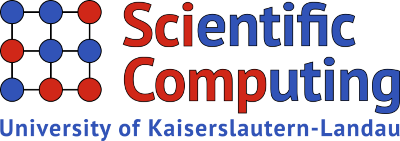Date and Place: Thursdays and hybrid (live in 32-349/online via Zoom). For detailed dates see below!
Content
In the Scientific Computing Seminar we host talks of guests and members of the SciComp team as well as students of mathematics, computer science and engineering. Everybody interested in the topics is welcome.
List of Talks
Event Information:
-
Thu18Jan2018
SC Seminar: Stefan Görtz
11:30SC Seminar Room 32-349
Dr. Stefan Görtz, Institut für Aerodynamik und Strömungstechnik, DLR Braunschweig
Title:
Surrogate and Reduced-Order Models for Use in Aerodynamic Applications, MDO and Robust DesignAbstract:
Reduced Order Models (ROMs) have found widespread application in fluid dynamics and aerodynamics. In their direct application to Computational Fluid Dynamics (CFD) ROMs seek to reduce the computational complexity of a problem by reducing the number of degrees of freedom rather than simplifying the physical model. Here, parametric nonlinear ROMs based on high-fidelity CFD are used to provide approximate flow solutions, but at lower evaluation time and storage than the original CFD model. ROMs for both steady and unsteady aerodynamic applications are presented. We consider ROMs combining proper orthogonal decomposition (POD) and Isomap, which is a manifold learning method, with surrogate-based interpolation methods as well as physics-based ROMs, where an approximate solution is found in the POD-subspace by minimizing the corresponding steady or unsteady flow-solver residual. The issue of how to best “train” the ROM with high-fidelity CFD data is also addressed. The goal is to train ROMs that yield a large domain of validity across all parameters and flow conditions at the expense of a relatively small number of CFD solutions. The different ROM methods are demonstrated on a wide-body transport aircraft configuration at transonic flow conditions.
In the second part of this talk we present a robust design optimization framework for aircraft design and show results for robust aerodynamic design. As a first step, we focus on quantifying uncertainties in the drag coefficient using non-intrusive methods. To reduce the computational effort required to compute the output uncertainties we make use of a Sobol sequence-based quasi Monte Carlo method (QMC) and a gradient-enhanced Kriging (GEK) surrogate model. A small number of samples is computed with the full-order CFD code TAU and its adjoint version to construct the GEK model. The statistics are computed by interrogating the surrogate model with a QMC method using a sufficiently large number of samples. In terms of the input uncertainties, we are interested both in operational and geometrical uncertainties. Our strategy to model the inherently large number of geometrical uncertainties is by using a truncated Karhunen-Loève expansion (tKLE), which introduces some elements of model uncertainty. Then, a Subplex algorithm is used to optimize different robustness measures. The test case used here to demonstrate the framework is a transonic RAE2822 airfoil.
Finally, current work aiming to extend our framework for uncertainty quantification and management (UQ&M) based on high-fidelity CFD to the loads process, especially at extremes of the flight envelope.
